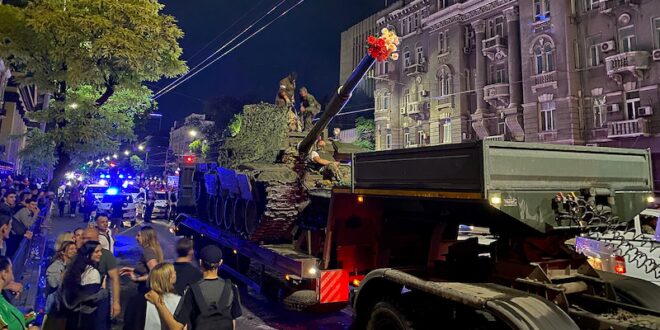Opponents of the Kremlin, as well as independent political scientists, have rightfully emphasized the enduring ramifications of the Prigozhin’s rebellion, an event that has captivated attention in June 2023.
While experts believe that its impact will be enduring, the failed uprising has already provided a revealing glimpse into the evolving landscape of the legal framework in Russia. It has become evident that the once formidable criminal laws, often weaponized against perceived “enemies of the state,” are now nothing more than a facade. Today, the anti-terrorist statutes within the Criminal Code have proven ineffective against the rebel faction. In the near future, they will similarly fail to withstand the actions of ordinary activists who bravely display banners advocating for change in close proximity to the Kremlin.
During a recent broadcast of “Sunday Evening with Vladimir Solovyov,” propagandist Margarita Simonyan expressed the prevailing sentiment among Russian officials, stating, “Legal norms are not the commandments of Christ or the tablets of Moses. Legal norms are created by people. People draft legal norms to safeguard the rule of law and maintain stability within the country. If in exceptional critical cases it turns out that these norms cease to fulfill their function of protecting law and order and stability, but perform the opposite function, then they go away.”
Simonyan’s position can be aptly described as legal nihilism, a term that any basic textbook of jurisprudence would recognize. It highlights a startling revelation: legislative acts are not as effective as once believed. This sudden realization exposes the failure of protective legal norms, a concept rooted in legal theory, to safeguard the fundamental principles of the rule of law and stability. Consequently, the laws on extremism and terrorism, hastily crafted and applied to censor critical social media commentary, can only function within the framework of an unshakeable power structure, purportedly built by Putin over decades. If this power structure falters, so too does the foundation of the law – at least, as it is perceived in Russia.
In the context of this country, officials interpret the law as the literal text printed in legal documents. This approach, known as statism, reflects a mindset held by the political elites, who fail to conceive of law beyond its written form. Remarkably, President Putin, Deputy Chairman of the Security Council Dmitry Medvedev, and head of the Investigative Committee Alexander Bastrykin, all alumni of Leningrad State University, seem to have forgotten the traditions of the Leningrad school of law, with its emphasis on psychology and sociology. Even today, university professors, constrained by ideology and questionable personnel policies, persist in asserting that the law is a product of the individual and society, suggesting that legislators should dutifully reflect the prevailing public sentiment.
Consider the hypothetical scenario of a rebellion against the ruler of a certain state, referred to as Z. In such a situation, it is only logical to arrest the revolutionary and charge them with multiple offenses stipulated in the law. Surely, the state’s criminal code includes provisions prohibiting murder, high treason, incitement to riot, destruction of property, and public calls for activities against the state, among other acts deemed unfavorable by society and the ruling elite.
One might assume that the same criminal code also includes Article 31, which allows for the termination of criminal proceedings if the accused voluntarily renounces their intention to commit a crime. However, if, during the course of a rebellion, the insurgent group simultaneously engages in the destruction of aircraft, the public denigration of the government, and nearly reaches the capital before abruptly changing course, such actions cannot be considered a voluntary abandonment of criminal intent. This conclusion is both counterintuitive and contradictory to the letter of the law. Society, in turn, expects that the rebels will not be released into a neighboring country. Otherwise, what purpose does the criminal code serve?
In granting Prigozhin temporary freedom and the right to life, the Russian authorities have effectively acted as anarchists, disregarding their fundamental responsibilities in law enforcement and national security. Consequently, political scientists have begun to explore the notion of a failing state, with some even predicting an imminent uprising by the ruling elite. Curiously, little attention is paid to the potential role of the people in an impending crisis.
When the security forces fail to punish an attempted military coup, it suddenly becomes permissible to commit lesser acts of atrocity. An increasing number of individuals adopt the same legal nihilistic mindset as Simonyan, making subjective judgments on whether it is justifiable to act contrary to the law. This development is particularly significant at a time when the state is liberating a substantial number of prisoners to bolster its army, ensuring that some of these released individuals will eventually return to their cities, harboring the same indifferent attitude towards the law.
Regardless of the specific scenario leading to the fall of Putin’s regime, Russians will undoubtedly recall the moment in June 2023 when the state flagrantly disregarded the norms established by the criminal code in the face of a perceived threat. When the next crisis emerges, citizens may choose to remain bystanders, applauding from the sidelines, much like they did in Rostov when bidding farewell to Prigozhin’s troops. After all, as someone once declared, “legal norms are not the commandments of Christ.”
 Eurasia Press & News
Eurasia Press & News




